Okavango Delta: A Unique Water Safari Experience in Botswana
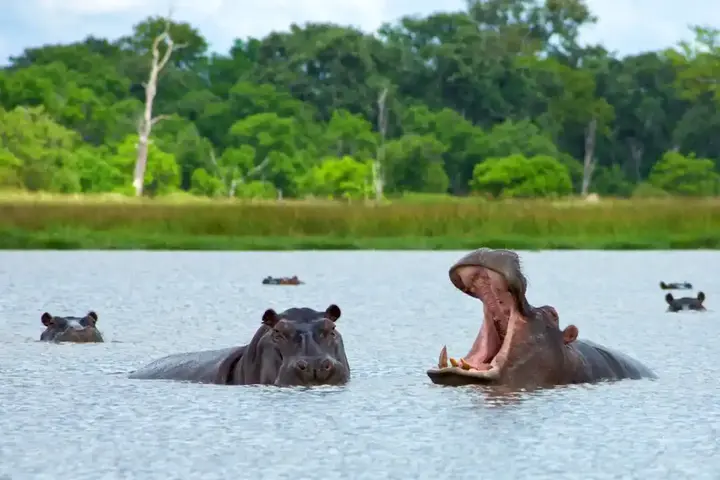
The Okavango Delta, located in the heart of Botswana, is one of the most exclusive natural destinations in the world. What sets it apart from other popular safari areas is that it is a unique water safari. Instead of exploring forests or dry plains, visitors can enjoy traditional boat trips tumbling through a network of canals and small islands formed by the annual river flooding. This experience offers a different perspective of wildlife and plant viewing in a unique aquatic environment.
Show key points
- The Okavango Delta in Botswana offers a unique water-based safari experience where visitors explore wildlife-rich wetlands via traditional mokoro boats and motorboats rather than vehicles.
- Spanning over 15,000 square kilometers, the delta is formed by the Okavango River which floods inland rather than flowing into the sea, creating a complex ecosystem of swamps, islands, and channels.
- This region boasts an incredibly diverse range of wildlife, including elephants, lions, hippos, leopards, and over 400 species of birds, making it a prime destination for both safari lovers and birdwatchers.
- ADVERTISEMENT
- The ecosystem thrives on a seasonal flood cycle, which supports a variety of natural habitats and ensures the continued survival of its flora and fauna.
- Luxurious and eco-friendly camps allow guests to stay in the heart of the delta, offering immersive nature experiences, stunning views, and even nighttime wildlife tours.
- The best time to visit for aquatic safaris is during the flood season from May to October, while wildlife is easier to spot on land during the drier months of November to April.
- Environmental conservation is a top priority in the region, with sustainable ecotourism and government efforts focused on protecting the delta’s fragile ecosystem.
Location and geography
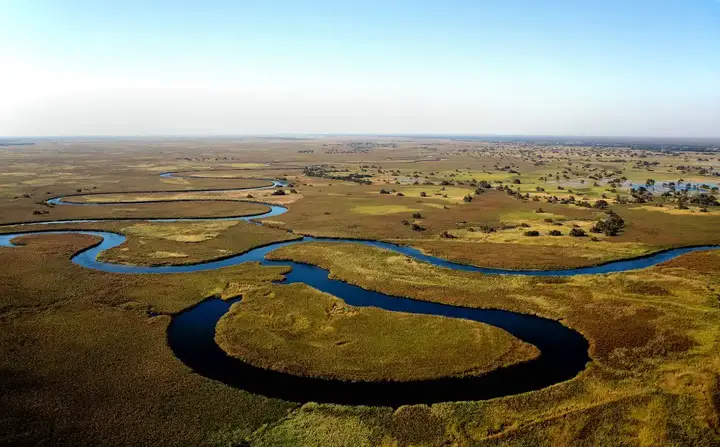
Located in northwestern Botswana, Okavango Delta is one of the largest inland deltas in the world. Covering an area of more than 15,000 square kilometres, it was formed as a result of the flow of the Okavango River originating in Angola and stretching through Namibia before reaching Botswana. What distinguishes the Okavango Delta is that it does not end in the sea like most rivers, but rather its waters are distributed in the lowlands and form a network of channels that flood the area during the flood season, creating a unique environment that is a haven for wildlife and rare plants.
Recommend
Aqua Safari Experience
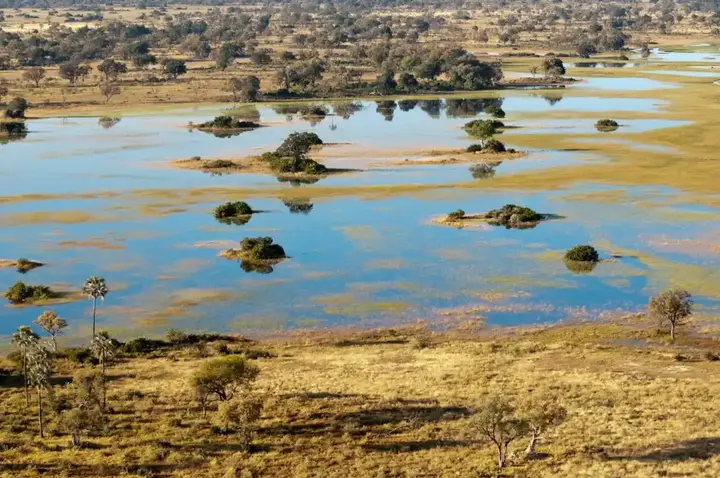
Unlike traditional safaris, which are usually done by jeeps, the safari experience in the Okavango Delta relies primarily on boats, whether it is modern motorboats or traditional boats made of wood known as "mokoro". These boats give visitors the opportunity to explore the delta from a water perspective, adding a new dimension to the adventure.
Mokuru trips are one of the highlights you can enjoy in the Delta. Local guides gently push the boats across the shallow waters using long sticks, giving you the chance to enjoy the views of the nature surrounding you in peace and quiet. You'll see elephants roaming near the water, you can see hippos slowly swimming in the canals, and you may be lucky to see a crocodile lying quietly on the banks of the river. These flights also provide an unparalleled opportunity to observe the rare birds that live in this area.
Rich wildlife
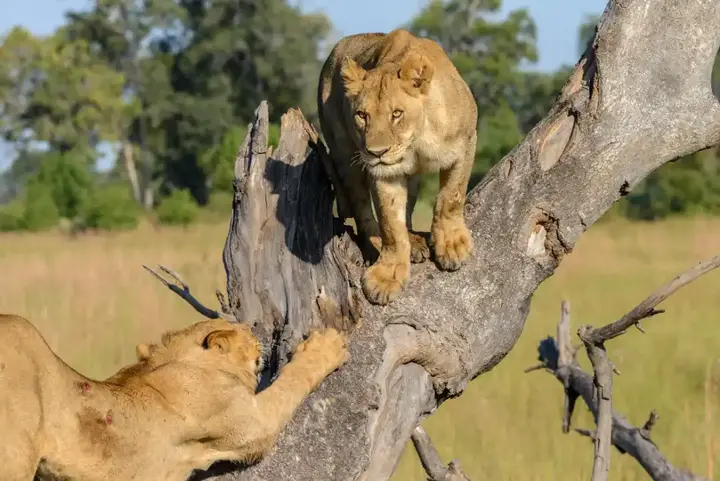
The Okavango Delta is home to an amazing variety of wildlife. Thanks to abundant water and dense vegetation, the delta attracts many species that depend on this unique ecosystem for survival. Elephants, hippos, and buffaloes can be seen moving freely in the area. Lions and leopards also live here and benefit from the extensive presence of herbivores for hunting.
One of the most beautiful features of the safari in the Okavango Delta is the great variety of bird species. The area is home to more than 400 species of birds, including herons, fish eagles, and swans. This is an ideal place for birdwatchers, as they can watch rare and migratory birds build their nests or catch fish from the water.
Unique biodiversity
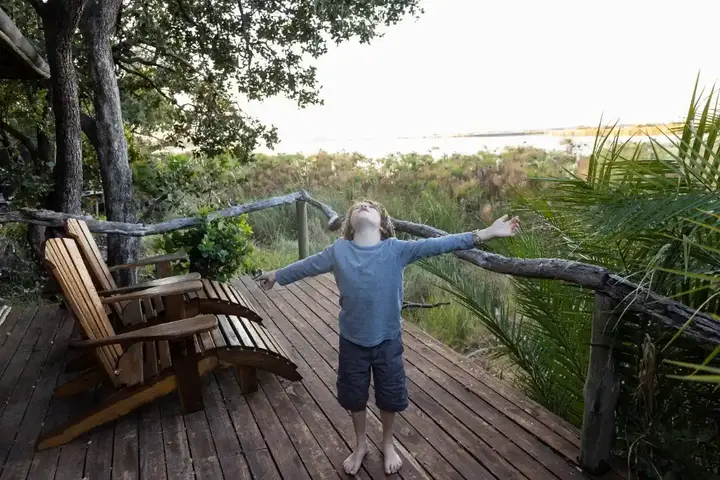
The Okavango Delta is one of the most diverse ecosystems in the world. They consist of a number of natural environments that include wetlands, islands, dense forests, and swamps. This ecological diversity makes it home to a wide variety of flora and fauna that cannot be found elsewhere. The balance of this ecosystem is highly dependent on the annual flood cycle, which replenishes the land with water and ensures the survival of wildlife.
The ecosystem of the Okavango Delta is characterized by a natural dynamic based on the flow of the Okavango River that changes seasonally. During the flood season, the delta rises and floods, turning it into a vast water paradise. At this time, boat trips are becoming the primary means of transportation, while land is shrinking and animals are more likely to be seen in search of new habitats.
Accommodation in the Okavango Delta
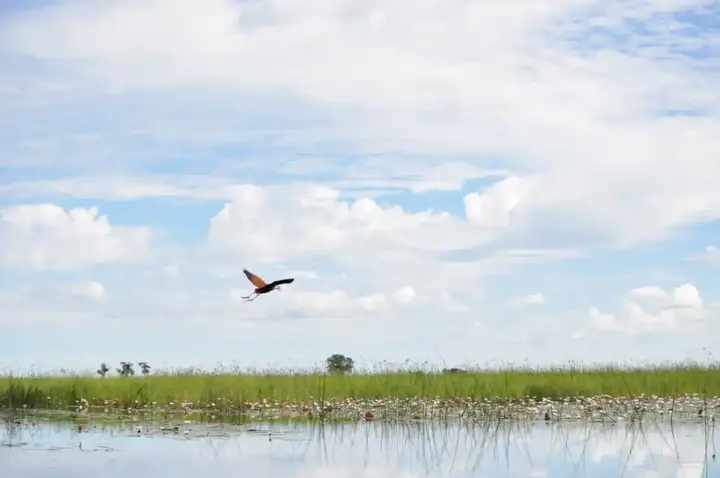
Visitors can enjoy a luxurious stay experience at the many camps and resorts that offer amazing views of the Delta. These camps are usually in harmony with nature, with simple designs that allow visitors to connect with their surroundings without causing disruption to wildlife.
Many of these camps offer a luxurious experience, where guests can enjoy staying in tents equipped with all modern amenities. Staying in these camps allows visitors to experience wildlife from the heart of nature, where they can hear the sounds of animals at night and enjoy the starry views clear in the Botswana sky.
Some camps also offer night tours that give visitors the opportunity to see animals that are active after sunset, such as hyenas and tigers. These night tours add an element of excitement to the safari experience, as watching animals in the dark is very different from watching them during the day.
BEST TIME TO VISIT Okavango Delta
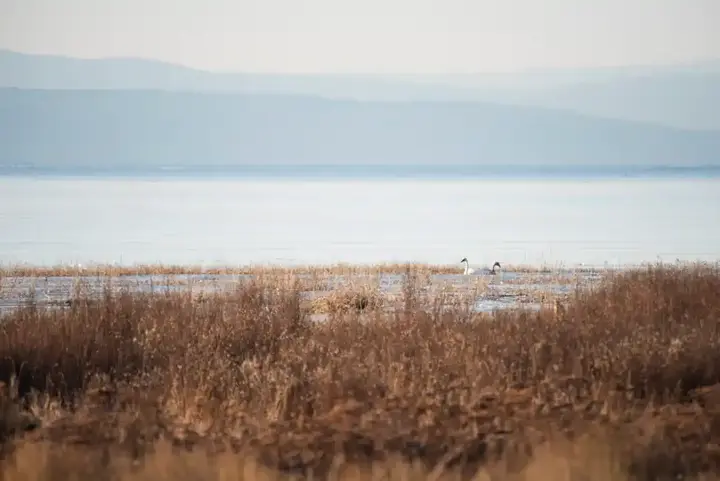
The Okavango Delta experience depends heavily on the timing of your visit. Flooding in the delta usually begins in May and lasts until October. This is the perfect time to visit the area if you want to enjoy the full water safari experience. During this time, the lowlands are flooded, creating an ideal environment for boat trips and watching wild animals gather around water sources.
However, if you're interested in watching wildlife move freely on land, the dry months between November and April may be more suitable. In this period, the water recedes and exposes large areas of land, allowing animals to move more freely and have more visibility.
Preservation and protection of the environment
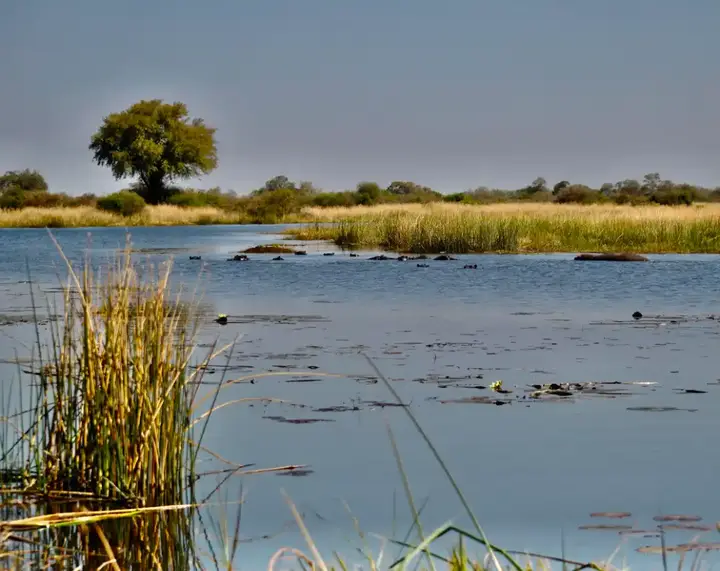
The Okavango Delta is an environmentally sensitive site, and its survival depends on ongoing efforts to preserve this unique ecosystem. Botswana is working to protect the region from environmental threats such as overfishing and unsustainable development. The presence of ecotourism in the region also helps to promote global awareness of the importance of protecting this natural paradise.
Tips for travelers
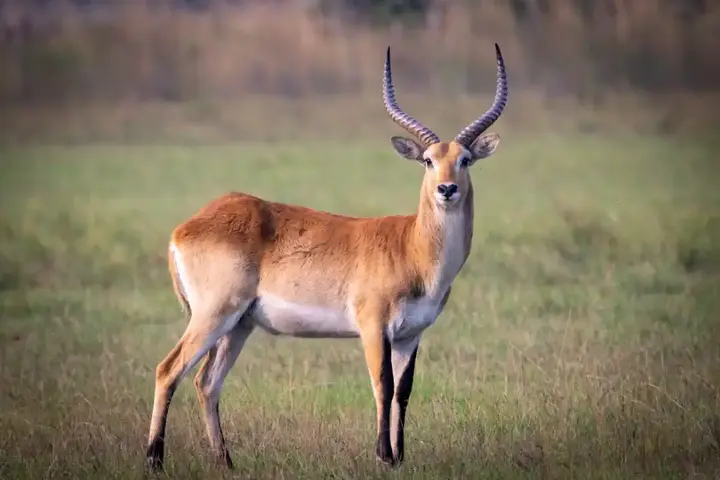
If you are planning to visit the Okavango Delta, there are some tips that can help you have an unforgettable experience. First, be sure to book your stay and safari tours in advance, especially during high season. Also, it is preferable to wear light and comfortable clothes that suit hot and humid weather at times. It is also recommended to bring sun protection, hats, and sufficient amounts of water to maintain hydration.
Finally, don't forget that the Okavango Delta experience is not just a safari, but an opportunity to connect with nature in one of the most beautiful and diverse places on earth. Whether you're looking for an action-packed adventure or a quiet relaxation in the heart of nature, Delta Okavango has an unforgettable experience.








